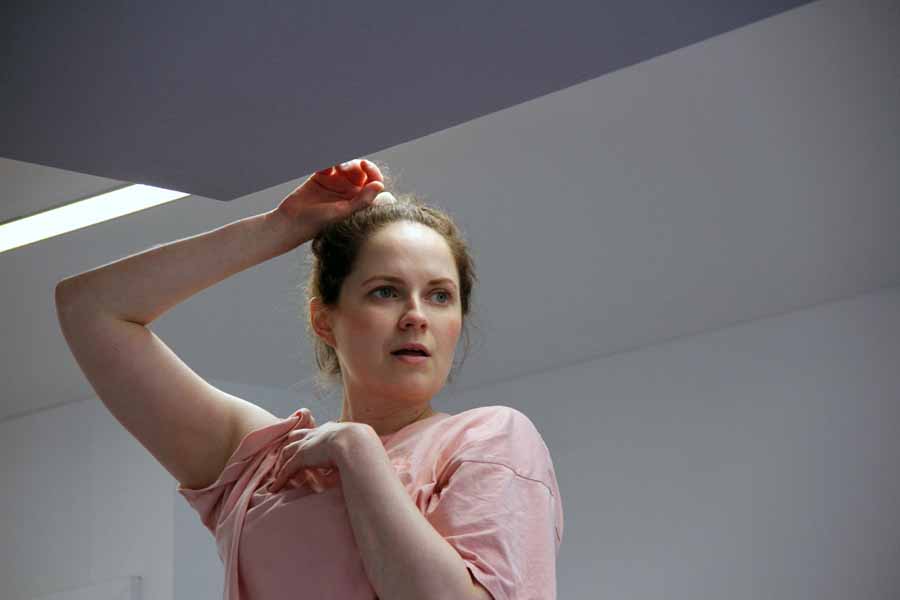Bathsheba Piepe share her experience of working on The Woman Who Turned into a Tree and how the play tackles toxic masculinity and the effect of the male gaze on women.
We caught up with actor Bathsheba Piepe, who stars in The Woman Who Turned into a Tree, and shares her journey with play and why audiences should see it.

OMNIBUS THEATRE: Can you share with us a little about your acting background and how you got into theatre?
BATHSHEBA PIEPE: I was a shy child, but being involved in drama at school helped me to find my voice and discover confidence I didn’t know existed. I found freedom in stepping into another character’s shoes. Thanks to the suggestion of an inspirational teacher, the late Rosemary Comrie, I auditioned for the National Youth Theatre, and that really changed my life. From there, I went to Warwick University and then onto LAMDA. Being an actor has opened up my world – from travelling through Europe with Flute Theatre, to being on the BBC with the Royal Shakespeare Company, and of course it has introduced me to the most extraordinary people.
OMNIBUS THEATRE: How did you become involved with this production, and what drew you to the role of Daphne?
BATHSHEBA: Emily Louizou and I met at the RSC at the beginning of 2020, when embarking on Maria Aberg’s Projekt Europa season. Then Covid meant that the entire season was cancelled. But in 2021, Emily approached me about working together on this text as part of Cut The Cord’s New Nordics Festival, led by the wonderful Camilla Gürtler. We then had a week of creative development together, and got to discover the world of Daphne. I was drawn to Daphne because she is full of jagged edges, complexity and contradictions. I was interested in the challenge of allowing her full depth and darkness without trying to smooth over the more uncomfortable parts of her personality.
OMNIBUS THEATRE: How did you prepare for the role of Daphne in The Woman Who Turned Into a Tree?
BATHSHEBA: The text of the play is so incredibly rich with clues and information about Daphne: who she is, what she is most afraid of, what she does, how she thinks, her family life, her past, what she believes about herself, the way she views others. And then Lisa’s ‘Love & Anarchy’ has been an enormous inspiration, because it explores many of the same themes – isolation, disconnection from nature, trying to soften your wild and wonderful self, and what happens when you let go. And as a company, we have researched the original Daphne myth, and other stories that have themselves been inspired by this myth. Also we have been interested in social media, in trying to reconstruct the sort of digital world that Daphne is drowning in when we first meet her in the play.
OMNIBUS THEATRE: What was it like working with writer Lisa Langseth and director Emily Louizou?
BATHSHEBA: Incredible. It is so exciting to be part of a project that is truly European in scope. It’s more important than ever to keep making international artistic connections. We are working with a Swedish text in translation, with a Greek director and an international company. And our project will be all the richer for this. Lisa is a breathtakingly sharp writer and it is an honour to be entrusted with her words and with bringing Daphne to life. And Emily is one of the most exciting and inspirational directors to be collaborating with.
OMNIBUS THEATRE: How does the Daphne myth relate to women’s experience of toxic masculinity today?
BATHSHEBA: In the play, Daphne is suffocated by the gaze of others, always judging herself by the warped reflection she thinks she sees in the eyes of other people. This is predominately the male gaze, as all of the other characters we meet in her story are men. She is finally able to free herself by turning into a tree, as in the Daphne myth. There is a powerful disruption in Daphne changing forms to escape from a man, in the myth, whereas in the play she does this to liberate herself from the pressures of performative perfection demanded by modern society.
OMNIBUS THEATRE: What has the rehearsal process for The Woman Who Turned Into a Tree been like?
BATHSHEBA: It has been incredibly collaborative which makes the rehearsal room so alive. Ioli Filippakopoulou, who also plays Daphne and is movement director for the production, brings so much dynamism to the space, and it is exciting to have so many creative voices and bodies contributing to the piece. With Emily and Ioli, there is a real freedom of expression, we are constantly experimenting with new ideas. I love the collective input which goes into breathing life into a text.
OMNIBUS THEATRE: Could you tell us a bit more about how original music, live sound and movement feature in the production?
BATHSHEBA: Music, soundscape, singing, and movement are as woven throughout the piece. They are essential tools in the telling of the story, and we are constantly exploring how to layer the text to given even deeper insight into the workings of Daphne’s mind.
OMNIBUS THEATRE: What is your favorite moment or scene in the play and why?
BATHSHEBA: This is impossible to answer because it changes constantly. The process of making this play is one of endless discovery, so I hope that even by the final performance, I am unable to pin down a favourite moment!
OMNIBUS THEATRE: What message do you hope audiences will take away from watching The Woman Who Turned Into a Tree?
BATHSHEBA: The freedom to cast off the rigid expectations placed on us by social media, permission to be our wild selves, to love every eccentricity we would usually seek to hide, to embrace our sharp edges.



